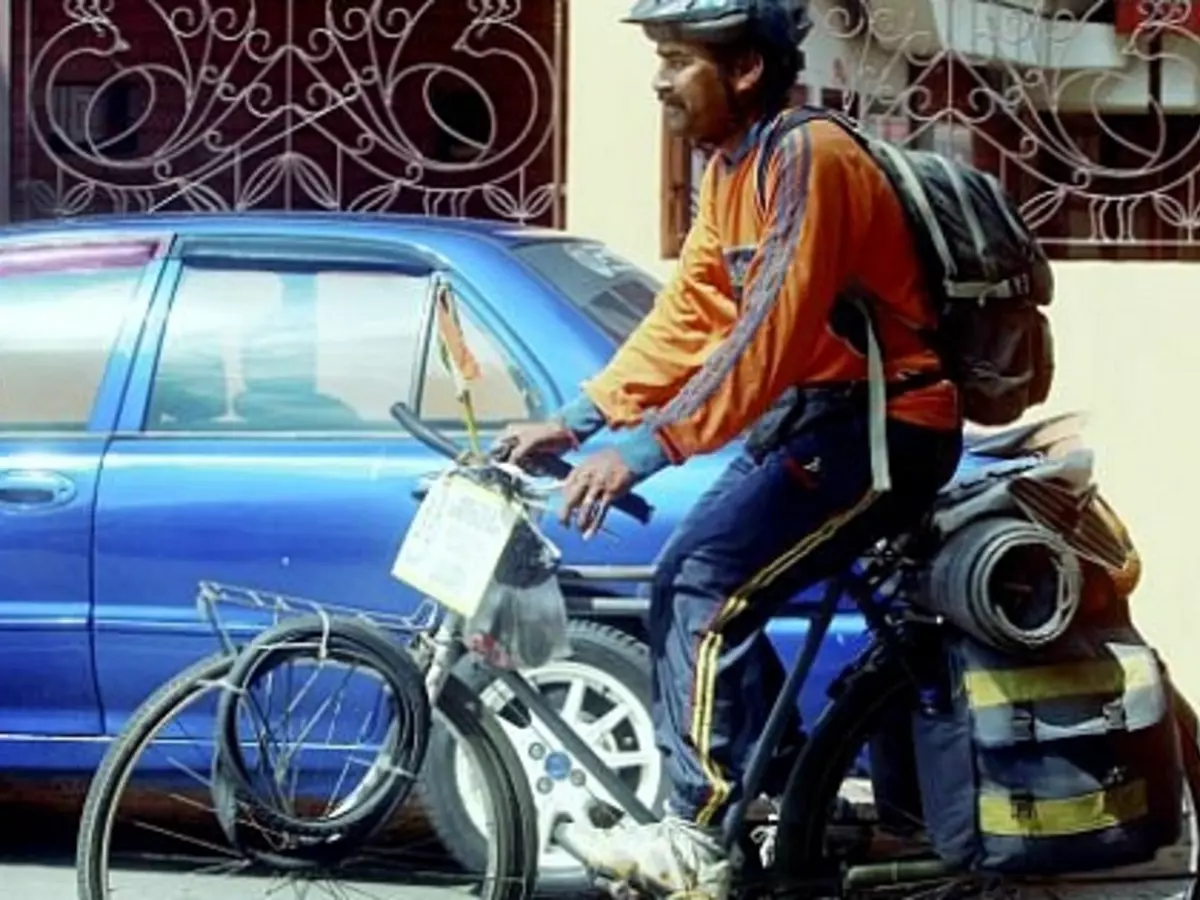Life Lessons From An Indian Shopkeeper Travelling The World On His Cycle
Rajesh Khandekar, 42, a Thane-based grocery-shop owner has ridden a cycle across the world. The gearless cycle has taken him to eleven countries across the generous streets of Asia the empty highways of Australia and the shivering lanes of New Zealand. The trip has filled 500 pages of his diary which contains his colourful highlight reel -- watching Mahabharat and other Ekta Kapoor serials.

Given all that it has taught him about the world in the last seven months, Rajesh Khandekar's modest bicycle might as well have wings.
Lessons from riding a cycle across the world

toi
Vada pao does not taste the same in Thailand.
Mahabharat is Indonesia's favourite TV show.
Navi Mumbai has more people than New Zealand.
Maggi can save your life.
Since December last year, this gearless cycle has taken this Thane-based grocery-shop owner to eleven countries across the generous streets of Asia, the empty highways of Australia and the shivering lanes of New Zealand.
On Friday, Khandekar, who left to spread awareness on global warming-returned with a fresh sensory appreciation for honking, traffic and vegetables. As he finally bites into a vada pao whose bun isn't sweet, the cheerful 42-year-old recalls the trip that saw him speaking to cows, sleeping in a graveyard and, also, unintentionally having his first non-vegetarian dish-dog soup. It began long before December, as a line on a paper map.
Mapping his journey

thestar
"He had drawn the route along a paper map," recalls Umesh Thakur, a Juhu-based cycling enthusiast who helped Khandekar fulfill his dream by approaching both Indian embassies and sponsors. Local corporator Vikrant Chavan and a co-operative bank helped pay for the tickets of the four flights that punctuated Khandekar's otherwise eco-friendly journey. Also, an international sports shop was ready to gift Khandekar an expensive international bike, but he refused saying his bicycle would be sturdier.
Sure enough, it was. His trusted two-wheeler cruised across 17,000 kilometres from Bangladesh to New Zealand. Previously, it has not only helped him cross 16 European countries but also undertaken several trips across India including one to Kargil. His mother does not argue with his passion anymore and it helps that he is single.
"There is no one to scold me," says the shopkeeper, who even rides his bike from his shop to the local market daily. "That's why I have no health issues. Also, it is great for the environment," says the shopkeeper who explained these benefits in a note in English that he carried on the trip.
In every new country, he would ask the officials of the local Indian embassy to translate his note to the local language. "I would take photocopies and distribute them," says the shopkeeper, who was startled by the fact that Australians travel in cars to buy vegetables in nearby stores. "They would say it was cold outside but I explained that cycling creates warmth in the body," says Khandekar, whose keen eye also made other little environmental observations.
For instance, "Thailand wastes electricity," says Khandekar, who slept mostly in temples, front yards and petrol stations.
The world is his oyster
After covering nearly 120 kilometres each day, sleep came easily to Khandekar, who was too tired to notice where he ate or slept. Once he crashed outside a Buddhist temple in Thailand only to realise the next morning that he had spent the night in a graveyard. Another time, he entered a restaurant in Vietnam, had noodle soup there and only noticed the signboard on emerging. "It had the picture of two dogs on either side," laughs the vegetarian, adding that he survived on Maggi for eleven days in Thailand. Later, though, a gas cylinder gifted by a stranger in Australia came in handy. "I cooked khichdi and omlette for the rest of my trip," he says.
The trip has filled 500 pages of his diary which contains his colourful highlight reel -- watching Mahabharat and other Ekta Kapoor serials in Indonesian petrol stations, desperately shouting out to cows and goats along unpopulated highways in Australia and galloping on his cycle all the way from Hanoi to Bangkok. "In Hanoi, my bicycle tyres gave away. I was not able to find tyres that fit and had to settle for smaller-sized ones," says Khandekar, whose cycle bounced and jumped in protest.
"We call this phenomenon ghodacycle out here," laughs Khadekar, who also struck many transient friendships with cyclists along the way.
Generosity came without asking
Language is dispensable, realised the shopkeeper who speaks broken English and communicated through gestures. Once a Chinese cyclist used Google Translate to communicate with him. Then, spontaneous generosity came without asking. A Thai family not only gave him a place to sleep but also treated him to dinner. "They cooked four dishes out of which I picked the vegetarian dish. On seeing this, the little girl went back into the kitchen and later emerged with two freshly-made vegetarian dishes," says Khandekar, who was moved to tears.
There were other subtle gestures. On the empty Desert road in New Zealand, where it gets dark by 6 pm, a cop followed him inside a petrol station and offered to drop him to the next point. In Australia too, a police car trailed him on a treacherous bridge to make sure he crossed it safely. "They really value every human being's life," he says.
This quality, apart from the slick cycling tracks he came across, made Khandekar envious as an Indian. But then, several moments compensated. He missed his country every time he saw the price of rice plates in Japan or heard 45 days of silence in Thailand. "No one honked."
(Originally published in the Times of India)








